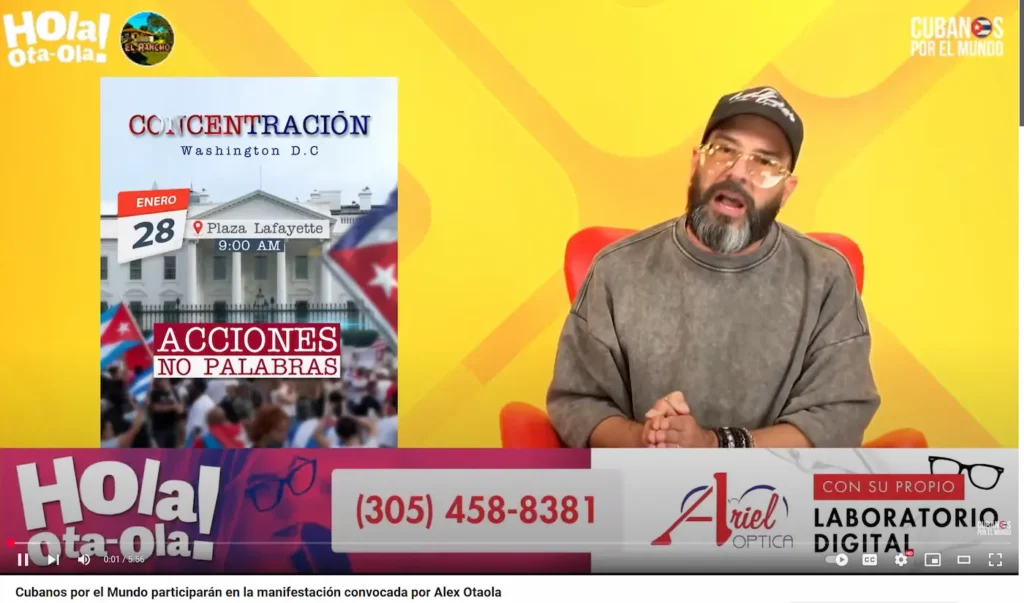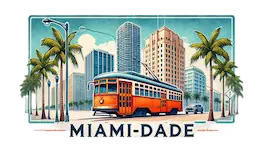|
Getting your Trinity Audio player ready... |
Tabla de Contenido/ Table of Contents
- 1 Otaola Against Castro Infiltration in Miami and the US: The Cuban Exile Strategy Against the Castro Regime’s Infiltration, Backed by Donald Trump and Marco Rubio
- 1.1 Trump’s Return to the Presidency and the Cuban Exile’s Fight
- 1.2 The Regime’s Objective: Infiltration and Manipulation
- 1.3 Otaola’s Call for the “Shutdown” and the Blow to the Regime Due to Lost Remittances
- 1.4 Trump’s Support and a United Exile Community
- 1.5 Trump Returns to the White House: Possible Measures to Achieve Democracy in Cuba
- 1.6 Otaola’s Call to Action in Washington, D.C.
- 1.7 Impact on the Anti-Castro Fight
- 1.8 Marco Rubio: A Strong Voice Against the Cuban Dictatorship
- 1.9 Conclusion
Otaola Against Castro Infiltration in Miami and the US: The Cuban Exile Strategy Against the Castro Regime’s Infiltration, Backed by Donald Trump and Marco Rubio
At a crucial moment for the Cuban exile’s resistance, Alexander Otaola has taken a leading role in organizing various actions aimed at weakening the Castro regime’s influence and strengthening the unity of the exiled community. From the creation of the new Red List 2.0 to calls for the Total Shutdown and the historic rally planned in Washington D.C. on November 28, Otaola has reaffirmed his commitment to Cuba’s freedom cause.
These initiatives aim not only to pressure the regime by limiting its financial resources but also to send a clear message to the world: the Cuban exile remains a stronghold of resistance, determined to end over six decades of oppression. Through these actions, Otaola calls on the community to stay active, united, and steadfast in the fight for a democratic future for Cuba.
Trump’s Return to the Presidency and the Cuban Exile’s Fight
Donald Trump’s return to the U.S. presidency in 2024 has reinvigorated the exile community’s fight against individuals tied to the Castro regime. Led by influencer Alexander Otaola, the new Red List 2.0 aims to identify and expose those who, both within and outside the U.S., attempt to influence American politics and culture in favor of the Cuban dictatorship.
Origins of the Red List
In 2020, during an interview with Donald Trump in Florida, Otaola proposed creating a list of artists and public figures associated with the Havana regime. The initial Red List garnered interest from Trump but did not gain momentum following his electoral defeat.
Now, with Trump’s return to the White House, Otaola has announced the upcoming Red List 2.0. According to the influencer, this will be a significant step in restricting propagandists’ access to the U.S. while bolstering anti-Castro policies.
Otaola promised this updated list would include more individuals who, in his view, “play both sides” while benefiting from access to the American market.
The Red List 2.0: Deportables Under Scrutiny
The Red List 2.0 focuses on non-citizen U.S. residents with clear or covert ties to the Castro regime. These individuals exploit U.S. economic and cultural opportunities while refraining from condemning the regime—or worse, indirectly supporting its interests. Notable figures include:
- Flor de Cuba: Influencer in Miami on a five-year visa, accused of connections to regime-affiliated individuals and promoting businesses indirectly benefiting the dictatorship.
- Chocolate MC: Urban singer whose ambiguous stance on the regime causes distrust in the exile community.
- El Micha: Urban music figure criticized for his lack of condemnation of the regime.
- El Yonki: Miami resident who avoids condemning the regime, leading to divisions within the exile community.
- El Bebesito: Influencer and singer allegedly linked to Sandro Castro, Fidel Castro’s grandson, and seen as a cultural influence strategy for the regime. Supported by Nelson de Miami Vice
- El Taiger (José Manuel Carvajal Zaldívar): Taiger is a Cuban singer and composer of urban music who rose to prominence in the reggaeton scene and other popular genres. Taiger faced rejection and protests in Miami due to his lack of clarity regarding his political stance. This made him a symbol of the cultural and political tensions between artists from the island and the exiled community.
- Elio Ahumada: Elio Ahumada is the former manager of the bar “Mio y Tuyo” which was owned by Sandro Castro Arteaga, grandson of the dictator Fidel Castro. He was also a member of the National Special Brigade “Boinas Negras” (Black Berets) who repressed the Cuban people. He also worked for a long time as “Security” for several Cuban reggaeton singers.
Regime Narratives from the Island
The Castro regime continues sending artists and public figures to the U.S. for events and activities benefiting the dictatorship economically and propagandistically. Figures include:
- Jorge Yunior: Cousin of El Taiger, publicly supports the regime while visiting Miami frequently.
- Alexander Abreu: Leader of Havana D’Primera, performs in the U.S. while maintaining a pro-regime stance.
- Yomil: Urban singer seeking to expand his career in the U.S. but criticized for regime connections.
- Pedro Calvo: Former Los Van Van member tied to official regime events.
- Buena Fe: Musical duo facing concert cancellations in Miami due to their pro-regime affinity.
- Haila María Mompié: Known as the “Diva of the Revolution,” rejected in the U.S. due to her ties to the regime.
- Michel Miraval: Castroite painter Michel Mirabal in Miami mocking the Cuban exile, Otaola promises to put an end to that
The Regime’s Objective: Infiltration and Manipulation
The Castro regime not only uses these figures to generate income and promote businesses linked to the dictatorship but also seeks to influence U.S. politics and create divisions within the exile community. These strategies include:
- Opinion Agents: Public figures like Ana de Armas who, directly or indirectly, promote the regime’s narrative through statements or cultural activities.
- Espionage and Social Chaos: The infiltration of agents into the United States to gather information and create chaos within exile communities, especially in Miami, which remains the cradle of Cuban exile.
- Political Influence: Attempts to sway U.S. policies toward Cuba, aiming to ease economic and diplomatic restrictions on the dictatorship.
Otaola’s Call for the “Shutdown” and the Blow to the Regime Due to Lost Remittances
Alexander Otaola, a prominent figure in the Cuban exile community, has repeatedly called for a “shutdown” aimed at cutting off all financial flows to the Cuban regime. The strategy focuses on halting remittances and phone recharges to Cuba, exposing how the regime relies on these revenues to sustain its repressive apparatus and crumbling economy.
The #TotalShutdown called for by Otaola has yielded results. Recent reports from the Cuban government acknowledge significant losses due to the reduction in remittance flows, a key source of foreign currency that has historically financed the regime’s operations. These losses amount to hundreds of millions of dollars, severely affecting the regime’s finances, which are already facing one of the worst economic crises in decades. This money, which the regime relied on to survive, was used not only to maintain basic services but also to fund its repressive machinery.
Otaola has urged the exile community to double down on their efforts and remain committed to not indirectly financing the regime. “Every dollar we send is a dollar they use to repress our brothers on the island,” he stated. The call reinforces the idea that economic pressure is a key tool to suffocate the dictatorship and accelerate Cuba’s transition to freedom.
Trump’s Support and a United Exile Community
With Trump’s return to the White House, a strong message is sent to both the Cuban dictatorship and the Cuban people.
Trump Returns to the White House: Possible Measures to Achieve Democracy in Cuba
With Donald Trump’s return to the U.S. presidency in 2024, his administration is expected to take an even firmer stance against the Castro regime, with the goal of accelerating Cuba’s transition to democracy. During his first term, Trump implemented severe policies against the dictatorship, including the reimposition of sanctions, travel restrictions, and limits on remittance flows to the island—measures that economically weakened the regime.
Possible Measures in the New Term
- Tougher Economic Sanctions
Trump is expected to expand sanctions on Cuban state entities and reinforce the economic blockade. These actions would aim to close the regime’s income streams, such as tourism and exports controlled by military-run enterprises. - Strengthening Title III of the Helms-Burton Act
This provision allows U.S. citizens to sue companies that utilize properties confiscated by the Cuban regime. Trump is likely to maintain this legal tool as a way to pressure third countries and foreign investors operating on the island. - Blocking Indirect Financing Channels
The administration could implement stricter measures to block remittance flows and other resources reaching the dictatorship through intermediaries. This would include oversight of remittance agencies and monitoring international transactions. - Direct Support to the Cuban Opposition
There will likely be increased financial and political support for pro-democracy groups within Cuba, as well as bolstering media initiatives to deliver free information to the island through platforms like Radio and TV Martí. - Cultural and Political Infiltration Restrictions
Mechanisms like the Red List 2.0, promoted by figures such as Alexander Otaola, could align with Trump’s administration to identify and restrict the entry of regime-linked public figures into the United States. - Increased International Pressure
Trump may seek to strengthen alliances with like-minded governments in Latin America and Europe to increase diplomatic pressure on the Cuban regime, highlighting its role in spreading authoritarian ideologies in the region.
Figures like Alexander Otaola have intensified their efforts to protect the United States from the influence of the Castro regime. The Red List 2.0 is a key tool to identify and press authorities to evaluate deporting individuals linked to the Castro regime or denying entry to those arriving from the island.
The Cuban exile community in Miami, supported by initiatives like this, continues to be a bastion of resistance against the dictatorship. The message is clear: there is no room in the United States for those who collaborate with or sympathize with the regime that oppresses millions of Cubans.
Otaola’s Call to Action in Washington, D.C.
The rally planned by Otaola in Washington, D.C., represents a critical moment for the exile community. Beyond discussing the Red List 2.0, it aims to send a clear message: the Cuban dictatorship not only oppresses its people but has also exported its authoritarian model across Latin America. With Trump’s support, exiles hope to advance the fight for freedom and democracy in the region. Possible measures from Trump’s administration related to Cuba are expected to be strong to achieve democracy on the imprisoned island.
November 28 promises to be a historic date, marking a turning point in the resistance of the Cuban exile. “The world needs to know that Cubans do not forget, do not forgive, and continue fighting for a future without dictatorship,” Otaola concluded.

Impact on the Anti-Castro Fight
Trump’s victory and Otaola’s proposal intensify the pressure on figures associated with the Havana regime. For many in the exile community, these actions are essential to maintaining Miami’s integrity as a bastion of Cuban exile.
Otaola has used his platforms to warn Miguel Díaz-Canel and other regime officials that Trump’s new term will further destabilize the Cuban political system.
The announcement of the new Red List marks a new chapter in the anti-Castro fight led from Miami. With the support of Trump’s administration, Alexander Otaola seeks to close the doors to any attempt at cultural or political influence by the regime on U.S. soil. The cradle of Cuban exile remains a bastion of resistance, now with new tools and renewed determination to confront the Castro dictatorship.
Marco Rubio: A Strong Voice Against the Cuban Dictatorship
Marco Rubio, recently re-elected as one of the most influential political leaders in the United States, continues to be an unwavering defender of Cuba’s freedom. With deep roots in the Cuban exile community, Rubio has used his Senate position to push policies aimed at pressuring the Castro regime, sanctioning its leaders, and supporting activists fighting for democracy on the island.
Rubio has reiterated his commitment to combating the influence of the Cuban dictatorship in the hemisphere and exposing the systematic abuses that have kept the Cuban people in misery for over six decades. His leadership strengthens the hope for political change in Cuba and solidifies his position as a key figure in the fight against authoritarianism in Latin America.
Conclusion
The Washington, D.C., rally on November 28 symbolizes the Cuban exile’s determination to combat any attempts at infiltration or manipulation by the Castro regime and fight for Cuba’s freedom. With the support of Trump’s administration, figures like Alexander Otaola lead a cultural and political struggle to maintain Miami as the bastion of freedom and justice for Cubans seeking a future without dictatorship.
Want more post like this?
Head over to our homepage for the latest updates from South Florida and beyond:











